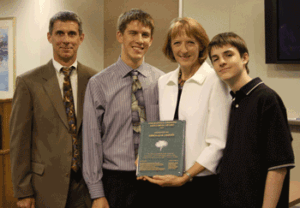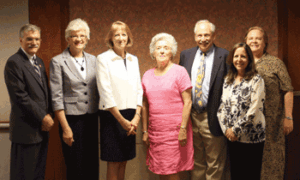Deborah Griffin Wins Mentoring Award
Beth Kilss, Jeanne E. Griffith Award Selection Committee Member

From left: Mark, Brian, Deborah, and Kevin Griffin. Photo courtesy of Tim Ware (Ideal Vision, LLC, idealvision@verizon.net).
On the afternoon of June 23, Deborah H. Griffin of the U. S. Census Bureau was presented with the Jeanne E. Griffith Mentoring Award in the conference center of the Bureau of Labor Statistics. The audience of approximately 50 was comprised of colleagues, family, and friends of Jeanne Griffith and Griffin; Robert Groves, U.S. Census Bureau director; and members of the award selection committee and Interagency Council on Statistical Policy.
The Winner
Griffin is a mathematical statistician at the U.S. Census Bureau, a position she has held for nearly 33 years. Currently, she is special assistant to the chief of the American Community Survey Office (ACSO). In this role, she serves as a program adviser and is responsible for special projects relating to both program evaluation and implementation.
Griffin earned a Bachelor of Science degree in mathematics from the University of Connecticut and completed graduate-level courses in statistics and survey methodology. She joined the bureau’s Statistical Methods Division in 1977 to provide operational analysis of multiple processing components of the 1980 Decennial Census.
During the 1980s, Griffin was a branch chief in the Decennial Planning Division, supervising staff and overseeing project coordination of testing and planning of the 1990 Census. She received her first bronze medal in 1987 for her role in developing the workflow for that census.
During the 1990 Census, Griffin was chief of the Census Evaluation Branch of the Decennial Statistical Studies Division. She monitored census operations and design evaluation studies and assisted with the development of census experiments.
Griffin became part of the team charged with the implementation and evaluation of the American Community Survey (ACS) in 1999. She established a staff to conduct critical ACS research and evaluation projects and was responsible for documenting critical research on the feasibility and quality of the ACS and overseeing the production of the ACS design and methodology report. In 2003, the ACS was moved into the Decennial Directorate and Griffin became a special assistant to the assistant director for Decennial Census and ACS. In 2006, she received her second bronze medal as part of an interdivisional team that used ACS data to produce a special product for Gulf Coast areas affected by Hurricane Katrina.
When the ACSO was established, Griffin was reassigned to the ACSO chief. She has authored several papers and given numerous presentations on all aspects of the ACS. Recently, she received a third bronze medal for developing a set of audience-specific educational materials for ACS data users. In 2009, she was named to the Federal Committee on Statistical Methodology.
Susan Schechter wrote in her nominating letter that “the ease with which Debbie approaches mentoring a wide variety of individuals results consistently in her teaching and improving their skill set and understanding of statistics, surveys, and data quality.”
Schechter continued, “Debbie has a natural skill in simplifying very complicated issues and teaching to others how to approach and solve very thorny problems. … Every single day, she sets an outstanding example for those around her, and it is a testament to her mentoring skills that so many people consider her their mentor …”
In conveying her thanks, Griffin said, “I get a lot of satisfaction when I see someone I’ve worked with get a promotion, give a great presentation, or complete an important project. It’s clear to me that young staff who get the support they need will grow in skill and confidence and be able to take on the challenges of the upcoming decades.
“The support I have received has encouraged me to want to pass it on—by mentoring and supporting staff around me. To teach when that’s needed and to always be aware of the example I’m setting. As I’ve gained confidence, and learned by both successes and failures, I felt in a position to advise others—to listen and give my honest opinions.
“For mentoring to be successful, it requires two things: Someone like me (and so many of the people here today) who is willing to find the time to reach out to junior staff, to have an open door for colleagues, and care about the example they set and someone who is willing to ask for help and listen to advice.”
The Ceremony
The award ceremony was conducted by Beth Kilss, Katherine Wallman, Andy Orlin, and Carol House. Kilss, formerly of the IRS and chair of the award selection committee, led the ceremony. Wallman, chief statistician at the Office of Management and Budget and chair of the Interagency Council on Statistical Policy, introduced Griffin and members of the audience. She also talked about the award during its early days. Orlin, Jeanne E. Griffith’s spouse, congratulated Griffin and expressed his appreciation to the award selection committee and ASA Government Statistics Section (GSS) for assuming management of the award process and for further strengthening the program over the past two years.
House, formerly of the National Agricultural Statistics Service and award selection committee member, presented Griffin’s award and read her citation. Schechter, Griffin’s supervisor and ACSO chief, highlighted Griffin’s extensive mentoring talents and many contributions to the office. She also noted how she had benefited from Griffin’s exceptional skills.
Groves, who was a member of the first award selection committee, congratulated Griffin, who he has known for more than 20 years. He also spoke about the value of mentors by noting that while human resource staff members seek equity and consistency, they do not often express care and support, and as organizations grow, the humanity is threatened. Large federal organizations are susceptible to this; hence, the value of mentors. Groves also noted that qualities of a good mentor include loving people, having patience, being modest, coming from all levels of the hierarchy, and listening before talking.


















